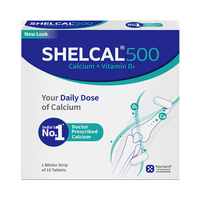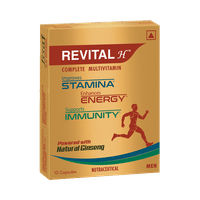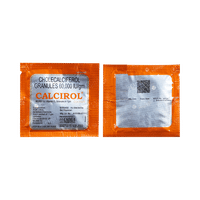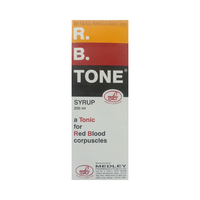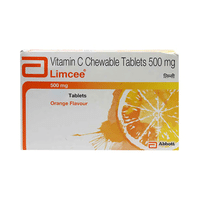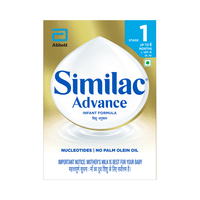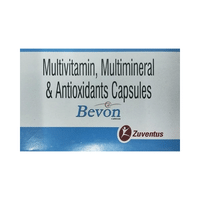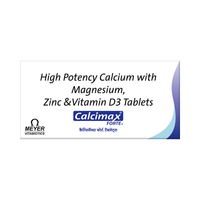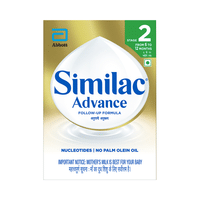Rs.489for 1 strip(s) (10 soft gelatin capsules each)
food interaction for Meg-B12
alcohol interaction for Meg-B12
pregnancy interaction for Meg-B12
lactation interaction for Meg-B12
food
alcohol
pregnancy
lactation
Meg-B12 Softgel Capsule may be taken with or without food, but it is better to take it at a fixed time.
None
None
CAUTION
It is not known whether it is safe to consume alcohol with Meg-B12 Softgel Capsule. Please consult your doctor.
CONSULT YOUR DOCTOR
Information regarding the use of Meg-B12 Softgel Capsule during pregnancy is not available. Please consult your doctor.
CONSULT YOUR DOCTOR
Information regarding the use of Meg-B12 Softgel Capsule during breastfeeding is not available. Please consult your doctor.
CONSULT YOUR DOCTOR
SALT INFORMATION FOR Meg-B12
Methylcobalamin(1500mcg)
Uses
Methylcobalamin is used in vitamin B12 deficiency.
How it works
Methylcobalamin is a form of vitamin B12 that restores its level in the body thereby helping in treating certain anemias and nerve problems.
Common side effects
Decreased appetite, Diarrhea, Nausea, Rash
Alpha Lipoic Acid(100mg)
Uses
Alpha Lipoic Acid is used in nutritional deficiencies.
How it works
Alpha lipoic acid acts as a potent antioxidant (substance that protects against cell damage) by neutralizing the free radicals (waste products formed in the body during energy production) such as reactive oxygen and nitrogen species. Further, it initiates natural antioxidant processes in the body. It also maintains the levels of Vitamin E and Vitamin C in the body.
Common side effects
Nausea, Abdominal pain, Allergic reaction, Diarrhea, Vertigo, Vomiting
Folic Acid(1.5mg)
Uses
Folic Acid is used in the treatment of anemia due to chronic kidney disease, iron deficiency anemia and anemia due to folic acid deficiency.
How it works
Folic Acid is a form of vitamin B. It plays a vital role in the formation of red blood cells, which carry oxygen throughout the body. It is also essential in pregnancy due to its role in the development of the unborn baby's brain and spinal cord.
Common side effects
No common side effects seen
Selenium dioxide(163.6mcg)
Uses
Common side effects
Calcium Pantothenate(10mg)
Uses
Calcium Pantothenate is used in the treatment of nutritional deficiencies.
How it works
Calcium Pantothenate provides essential nutrients.
Common side effects
Central nervous system depression, Coma, Ectopic mineralization
Vitamin B6 (Pyridoxine)(1.5mg)
Uses
Vitamin B6 (Pyridoxine) is used in the treatment of nutritional deficiencies.
How it works
Vitamin B6 (Pyridoxine) provides essential nutrients.
Common side effects
Burning sensation, Tightness sensation, Headache, Nausea, Sleepiness, Upset stomach, Paresthesia (tingling or pricking sensation)
Vitamin E(25IU)
Uses
Vitamin E is used in the treatment of Vitamin E deficiency.
How it works
Vitamin E contains vitamin E that acts as an antioxidant. It stops the formation of harmful chemicals called free radicals and prevents further production as well as accumulation of free radicals.
Common side effects
Nausea, Tiredness, Headache, Rash
Vitamin A(5000IU)
Uses
Vitamin A is used in the treatment of vitamin A deficiency.
How it works
Vitamin A contains vitamin A which is a nutritional supplement. It acts directly on the biosynthesis of various proteins, including those involved in regulation of various cell functions or in determination of cell sensitivity to hormones and hormone-like factors. It is important for growth and development, for the maintenance of the immune system, and for good vision.
Common side effects
No common side effects seen
Chromium polynicotinate(200mcg)
Uses
Common side effects
Inositol(100mg)
Uses
How it works
Inositol
Common side effects
Limited data available
SUBSTITUTES FOR Meg-B12
1 Substitutes
1 Substitutes
Sorted By
 Rs. 141.60save 72% more per Soft Gelatin Capsule
Rs. 141.60save 72% more per Soft Gelatin Capsule
Expert advice FOR Meg-B12
- Methylcobalamin helps replenish vitamin B12 level in your body.
- This further helps in regeneration of damaged nerves in the body.
- Avoid or limit alcohol consumption while taking this medication.
- Inform your doctor if you are pregnant, planning to conceive or breastfeeding.
- Do not stop taking the medication even if your symptoms improve. Take it as per the dose and duration prescribed by your doctor.
Frequently asked questions FOR Meg-B12
Methylcobalamin
Q. What is Methylcobalamin?
Methylcobalamin contains vitamin B12. Vitamin B12 is an essential nutrient which is required by the body to make red blood cells and maintain a healthy nervous system. It is also important for releasing energy from food and using vitamin B11 (folic acid).
Q. Why can’t I get sufficient vitamin B12 from my diet?
You can get vitamin B12 from sources like meat, fish, eggs and dairy products. While people who are vegetarian or vegan may not get Vitamin B12 as it is not found naturally in foods such as fruits, vegetables and grains. Therefore, deficiency of Vitamin B12 is usually noticed in vegetarians or vegans.
Q. What happens if I have vitamin B12 deficiency?
Deficiency of vitamin B12 may cause tiredness, weakness, constipation, loss of appetite, weight loss and megaloblastic anemia (a condition when red blood cells become larger in size than normal). It may also lead to nerve problems such as numbness and tingling in the hands and feet. Other symptoms of vitamin B12 deficiency may include problems with balance, depression, confusion, dementia, poor memory and soreness of the mouth or tongue.
Alpha Lipoic Acid
Q. Is Alpha Lipoic Acid a vitamin?
No, Alpha Lipoic Acid is not a vitamin
Q. Is Alpha Lipoic Acid an amino acid?
No, Alpha Lipoic Acid is not an amino acid
Q. Is Alpha Lipoic Acid natural?
Yes, Alpha Lipoic Acid is natural as it is synthesized in the human body, and in a wide variety of foods from plant and animal source
Folic Acid
Q. Is it ok to take Folic Acid when not pregnant?
Usually, folic acid requirements are met from the diet and therefore additional supplements are not required. In general, Folic Acid is recommended only when you have a deficiency of folic acid. However, Folic Acid is advised to women who are pregnant and who want to conceive. The medicine should be taken at least 4 weeks before pregnancy and should continue its use up to 3 months of pregnancy. Consult your doctor if not sure.
Q. Can Folic Acid cause weight gain?
Animal studies on Folic Acid suggest that taking the medicine in excess along with a high-fat diet may lead to weight gain and fat accumulation. But this weight gain was not evident when taken along with a normal or low-fat diet, even with excess Folic Acid. In humans, similar studies have not been conducted and therefore knowledge regarding weight gain is lacking. Therefore, if you are on Folic Acid eat a low-fat meal to be on the safer side.
Q. How long does Folic Acid take to work?
Folic Acid usually starts working within a few hours of taking it. If you are taking it for iron deficiency anemia, you may start feeling better after a few weeks of taking it. In case you are taking it during pregnancy, you may not notice any difference but this does not mean that the dose is not working. Continue taking Folic Acid for the duration recommended by your doctor.
Selenium dioxide
Calcium Pantothenate
Vitamin B6 (Pyridoxine)
Vitamin E
Q. Is Vitamin E good for skin?
Yes. Vitamin E is very good for the skin. It protects against harmful ultraviolet rays, prevents any sunburns or tanning, nourishes skin with essential antioxidants and combats ageing. Its antioxidant effects destroy any harmful toxins, moisturise your skin and make your skin smooth and healthy. It will also prevent fine lines, wrinkles and other signs of ageing. This improves your appearance and boosts your self-confidence too.
Q. What foods contain vitamin E naturally?
There are many food items that contain vitamin E naturally. They are vegetable oils (such as wheat germ, sunflower, safflower, corn, and soybean oils), nuts (such as almonds, peanuts, walnut, and hazelnut), green leafy vegetables (such as spinach and broccoli), cereals, fruit juices etc. Taking such foods in your daily diet will help you get more vitamin E and improve your overall health.
Q. Does Vitamin E improve immunity?
Yes. Vitamin E helps improve immunity. It strengthens your immune system, and increases your ability to fight infections. The antioxidants that are present in Vitamin E, prevent any harmful toxins from damaging the various organs in our body.
Vitamin A
Q. What is Vitamin A used for?
Vitamin A is used for improving the eyesight, maintaining cells of the skin and the lining of the digestive, urinary and respiratory tracts. It also helps in the formation of red and white blood cells in our body that are important to carry out the various essential functions of our body.
Q. What if I take too much of Vitamin A?
If you take too much of Vitamin A, it can lead to birth defects, abnormalities of the liver and disorders of the central nervous system. It can also decrease bone mineral density, leading to an increased risk of osteoporosis. This is because an excess of Vitamin A suppresses the building up of bones and increases its breakdown. The rate of calcium absorption by Vitamin D can also get affected due to excess of Vitamin A. Therefore, it is advised to use Vitamin A only as directed by your doctor.
Q. Which foods contain vitamin A?
There are various foods that contain vitamin A naturally. These are milk, cereal, leafy green vegetables, carrots, sweet potatoes and pumpkins. Other than those, orange vegetables are loaded with vitamin A as they contain a pigment called beta carotene. It is also found in eggs, dairy products, fruits like mangoes and apricots, liver and certain types of salmon.













